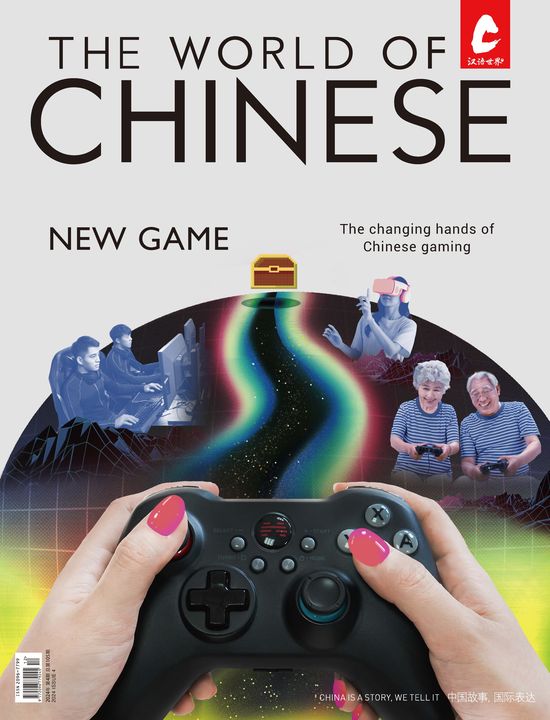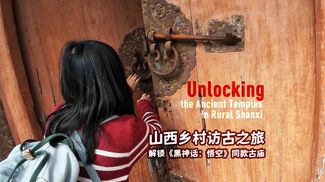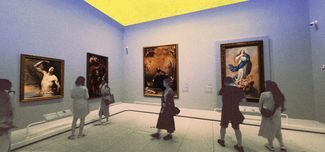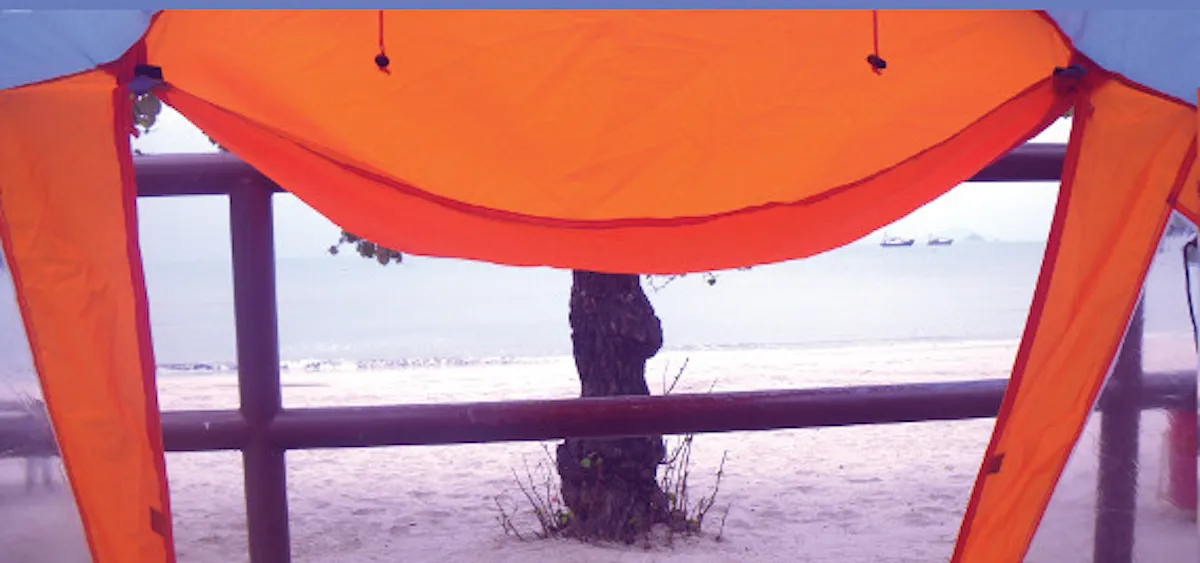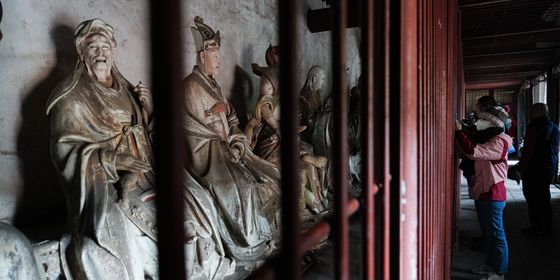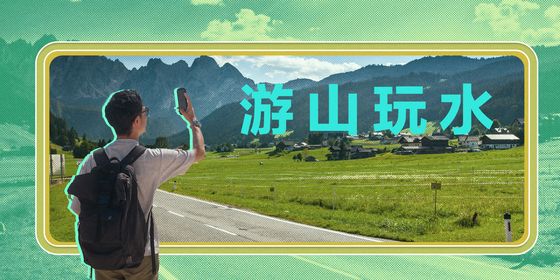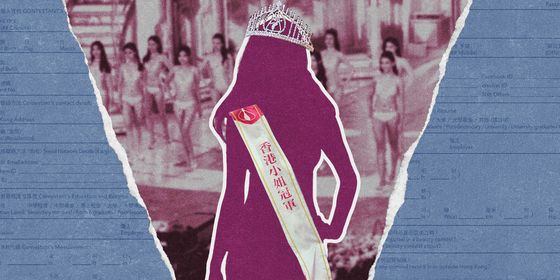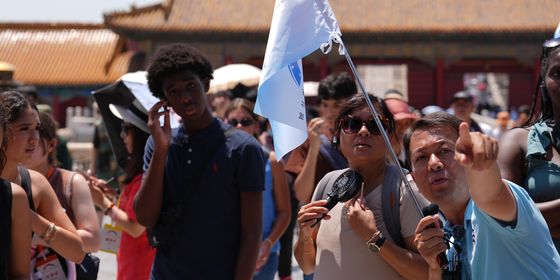Going to one of the most densely populated places on earth for a little peace and quiet
Hong Kong conjures to mind green hills dotted in cramped urban sprawl, an island prairie of concrete and glass, but longtime residents and regular visitors can regale you with tales of giant buffalo bulls roaming amongst the shops and pythons in their parlors. Places like Lantau Island (大屿山) host wildlife and natural beauty sharing space with humanity in ways that would be positively unthinkable on comparable mainland cities. Rolling mountains, isolated beaches, large fauna, and historical sites abound.
And you can experience it all in a tent.
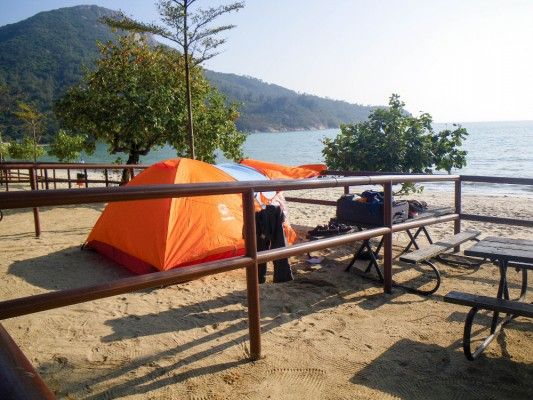
Accommodation is what you make it on Pui O Beach
If you tut at the sight of Rolex and Omega shops and if your stomach rolls over cold every time you see the word Dior, then Hong Kong can provide unusual solace if you bring your shelter on your back (as well as a reading light and a bottle of whatever keeps you warm at night).
You must simply make your way to the island of Lantau. The only thing you really need in Hong Kong, regardless of how hard you intend to rough it, is an Octopus Card. You may only be staying for a few days and sleeping in the sand, but without it you will be gawped at on buses and on the MTR as some sort of stumbling, drunken barbarian who has wandered into Hong Kong from the past for the specific purpose of holding up queues.
If indeed you fly into Hong Kong and are looking for Lantau, congratulations, you’ve found it. It’s directly opposite the airport. So much for off-the-beaten-track. When you exit the airport, you’ll have your choice of taxis: one type goes to the bustling congestion of Hong Kong proper and all of the stress that goes with that experience, the other stays on Lantau—an option you’ll notice few choose. It is, however, the smarter choice.
Lantau is the largest Hong Kong island, and within two minutes in the taxi, you’ll gure out why they call it the “lungs of Hong Kong”. Even if you don’t plan to camp, your first stop for unparalleled peace and tranquility—and if for nothing else than to dispel any notions you previously had of Hong Kong as a skyscraper-addled cityscape—should Pui O Beach ( 贝澳泳 滩 ), a camper’s oasis outside one of the busiest metropolises in the world.
For a few Hong Kong dollars, you pay a person at the front desk (as well as fill out a few forms to ensure safety of the environment) to lay down your stakes in a camping allotment surrounded by steel bars. Having been three times, I can confidently state that I have never seen more than six or so of the dozens of allotments taken. The water itself is great for a dip but little more; the temperature may not be conducive to swimming depending on when you arrive.
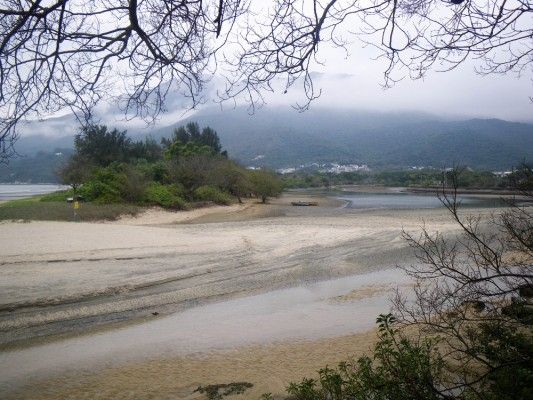
Fog brushes the mountains of Lantau Island above an empty beach between Silvermine Bay and Cheung Sha
As you set your stakes down and prepare for a night of heat or cold—as the fickle Hong Kong weather permits—you may have noticed that, even though the beach is clear of any human interference, you are being watched, stared down by wild, horned beasts. Water buffalo mill about all over the island, but the best place to watch them is from the comfort of Pui O Beach. Though these kind, gentle animals have a tendency to wander into the shops and even occasionally sleep on major streets, there are signs everywhere telling visitors and residents not to annoy the lovely creatures or bar their path. One might conjecture, however, that anyone who fancies themselves able to tangle with a 1,000 kilogram wild beast is either a superhero or a moron.
As to facilities, if you’ve packed properly, there are more than enough amenities on Pui O Beach to keep one in quiet solitude for days. Barbecue pits are supplied, and if you don’t mind taking a cold shower, visitors can avail themselves of the beach’s restroom and outdoor shower. Do also keep in mind that sand, though it seems fun for an afternoon of lounging about, is not a great medium for sleeping, so some sort of cushion will be in order if you wish to rest in comfort.
The water buffalo will not wander into your tent, as there is a small ditch barring their entry. It’s a very small ditch. In fact, if they wanted to, they’d nuzzle up to you in your tent and there would be very little you could do about it, but luckily, water buffalo don’t prefer the beach lifestyle, as the kindly woman running the camp site informs visitors. Still, beware your steps—if not for the buffalo then for what they leave behind.
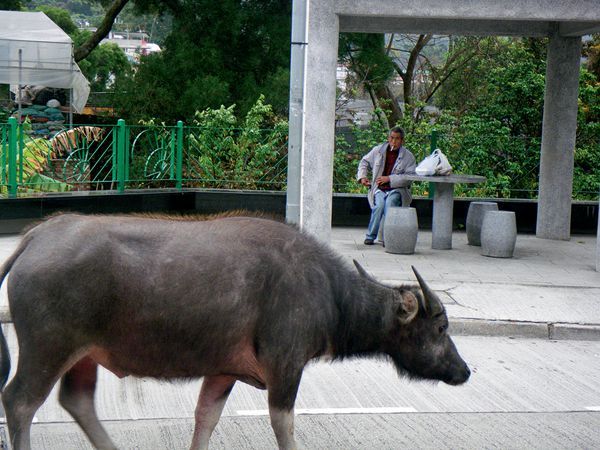
Wild buffalo roam the sleepy streets of Lantau
Sitting in the empty of a beach with green islands rolling on a blue-green sea, it’s easy to think of oneself as being completely in the wilderness, but Pui O is hardly isolated. In fact, a short walk up a hill from a beach, you can even find—thank all that is holy—a pub with wifi. This is, after all, still Hong Kong.
While Silvermine Bay Beach is far more popular and the nearby Cheung Sha is arguably more beautiful, Pui O’s curious blend of peace and nature is one of the best spots for camping in all of Hong Kong. When you wake up with the sunrise, perhaps to the careful steps of water buffalo that have walked those hills and mountains for millennia, you might even be lucky enough to catch a glimpse of the illusive pink dolphins of Hong Kong on the orange horizon. Your chances are about one in a thousand without a boat, but it’s worth a few moments waiting if you can spare it; they are amazing, truly unique creatures that deserve respect and attention—before modernity claims them as yet another victim of progress and development.
Beyond that, Hong Kong, and especially Lantau, boasts a wide variety of animals, including porcupines, many varieties of insects and birds, and, of course, the terrifying but lovingly placid Burmese python, which grow up to six meters on Lantau—one of dozens of species of snake to be found in Hong Kong. You might even, on one of the many hiking trails, find yourself treading across the path of a rare cobra. If you tread on it, well, it’s not something you’ll be doing twice. Unlike the pythons, cobras have been known to go down to the beach for a bit of a dip.
Of course, Lantau isn’t all nature and wildlife. With Kowloon just a few MTR stops away, Lantau has a number of sites to keep even the most active tourist busy for at least a few weeks. For a start you’ve got Disneyland Hong Kong and even the remote traditional fishing village of Tai O. But, for your money and your time, there is perhaps no better attraction in Lantau than the Po Lin Monastery (宝莲禅寺) and the accompanying Tian Tan Buddha (天坛大佛).
It is a long hike from Pui O, even with the exceptionally beautiful seaside hiking trails provided, so you’re probably better off taking one of the buses that leave once an hour from the local stop to the Ngong Ping plateau.
One might, of course, hike up to Po Lin Monastery, built in 1906 and lovingly cared for throughout its history, and it has been said that the grueling walk up the mountain is both rewarding and beautiful. Similarly, the hour-long drive is said to be a relaxing road trip from the city. I wouldn’t know. Hong Kong has made life easier for the adventurous lay about with the advent of the Ngong Ping 360, a 5.7 kilometer cable car that takes about 25 minutes to take visitors to the Po Lin Monastery.
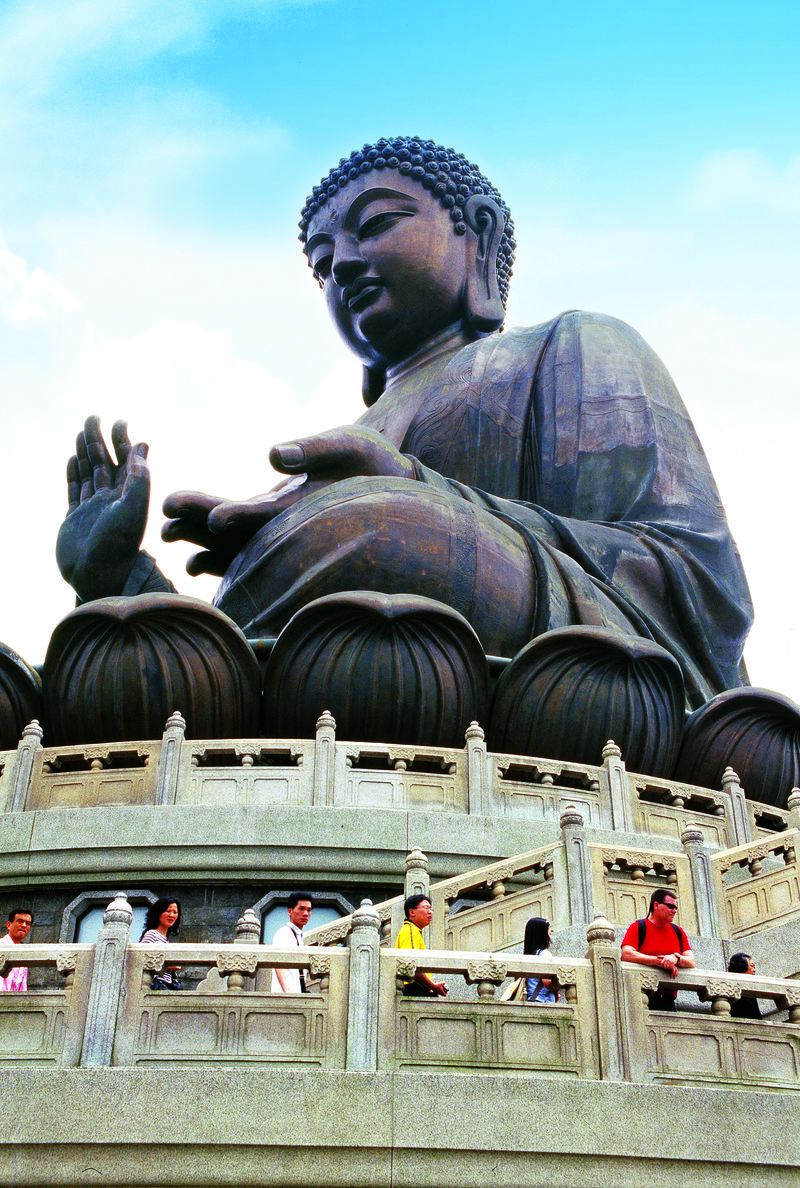
The Tian Tan Buddha sitting in the sky of a Lantau mountain
Visibility on the ride varies with clarity. Fog, for Beijing readers, is a sort of evaporated water that blots out the sky and manages not to stink like a Marlboro butt up each nose. While it can add to the mysticism and overall aesthetic of the Po Lin Monastery, few things compare to the long, slow ride over green water and greener hills toward what is certainly one of the most amazing sites in all of Hong Kong. Dense fog can also make for an interesting cable car journey, as you stare into thick, white fog on every side until a cable car comes out of the mist to surprise you—as people on the way down cling to the glass for signs of life through the mist.
For the brave souls who hiked, the monastery provides little respite; visitors will need to hike 260 stairs (with three small way stations for the, like me, exercise impaired) to get to the glory of the Tian Tan Buddha—the largest sitting Buddha statue on planet earth: 34 meters high, 250 tonnes, and made out of 202 individual bronze pieces. The sheer size of it is a wonder to behold; it is said that, on a clear day, it can be seen from Macao.
However, on an unclear day, you can’t even see the Buddha’s head from its feet. While it may not be the sort of thing that looks good in a photograph, on a foggy day, as you climb the stairs, a grayish monolith starts to poke through the mists and the full form of the Buddha is slowly revealed in an imposing, awe-inspiring silhouette that gets clearer with every step. Visitors will find themselves staring at the shape hoving into view, ignoring both the view of dew sprayed trees on each side and the wheezing and coughing of their fellow pilgrims, in complete wonder.
It is perhaps the greatest compliment I can give the site to say that, even in the worst conditions for viewing, it is still spectacular.
With the greatest site in Lantau seen, it might be time to crawl down the mountain to see the transport, if for no other reason than curiosity. If you find yourself bored with the colossal Buddha, the cobras, the roaming buffalo, and what amounts to a private (though still very much public) beach, then the city is easy to find. Just pop on the MTR and you’ll be in Kowloon in no time at all for all your shopping, and, let’s face it, your visa.
It is a truth universally acknowledged that a foreigner in China in possession of a job will be in want of a visa. Any expat who has stayed in China for any length of time knows the horror of the Hong Kong visa trip. And, while that new job certainly contains the potential for income forthcoming, it hardly makes up for the lack of funds with which one goes to obtain said visa on nothing but a bed of promises. There are an endless list of online advice columns and easy border crossings to help one with the curious and annoying chore of having to go to China to achieve passage into China, and Lantau, even so far removed, is still a great place to start your visa run.
After you’re done gnashing your teeth, crying, screaming, and literally spitting at the torture chamber of misery that is the Chinese visa office in Hong Kong, you get to hop back on the MTR and go back to your tent on the beach rather than a matchbox motel in Mongkok—for a fraction’s fraction of the price.
But, if you wish to keep your camping holiday pure and simple, the place you’ll need to become the most familiar with is Discovery Bay (愉景湾). If you decided to start your trip in Hong Kong proper, one of the easiest ways to escape comfortably is via the Mui Wo ferry from Central. It takes you directly to an area filled with all the shops you’ll need to survive during your time on Lantau as a willing (or poor unwilling) camper/visa hunter. Everything from coal for your personal barbeque (along with all manner of fresh sea food) to an extra blanket can be found here as well as every variety of restaurant you could wish for—all just a bus ride away from your camp site.
In the end, camping is often just about sitting in the sun, reading, and enjoying the company (or lack of it). To stroll along shops in the busiest town center in Asia in the morning and enjoy the sound of lapping waves on a near deserted beach in the evening is an experience that can not be overstated. It is often said that Lantau is an escape from Hong Kong, an oasis. But it doesn’t seem that way. Lantau’s calm beaches, lush scenery, and incredible wildlife isn’t an escape; it’s the way it should be.
But it might not be that way for long. So far, Hong Kong has protected this natural reserve, but new development projects on the horizon are an ever-present danger for the relative tranquility of the island. At every step—be it building prisons, roads, or buildings with more than three floors—the people of Lantau have fought to keep their island healthy. They don’t always win, but it’s a fight worth having. The marriage of modernity and nature found in Lantau is perhaps a lesson for mainland cities—a lesson that it takes local love rather than departmental dictates to maintain a balance between mankind and nature.
“Hong Kong Camping” is a story from our newest issue, “Internet Celebrity”. To read the entire issue, become a subscriber and receive the full magazine. Alternatively, you can purchase the digital version from the iTunes Store.
